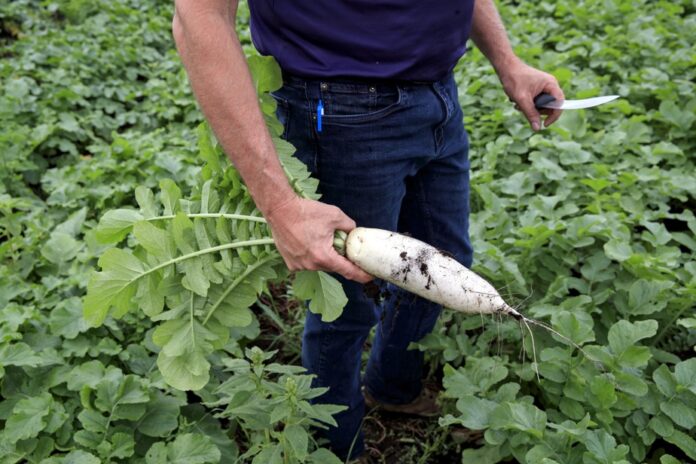Agricultural producers in Quebec are struggling to recover from a “catastrophic” season due to the heavy rains that fell on the province this summer. However, they will have their hearts in celebration on Sunday, when several of them will open their doors to the public.
More than fifty producers across Quebec will be ready to welcome consumers to discuss their profession, showcase their products or offer u-pick, for example, during the “Eat local” open days.
“There is also a whole extension aspect in relation to sustainable development, the environmental side is still important,” underlines Martin Caron, general president of the Union of Agricultural Producers (UPA), which organizes the open days. Educational activities will be offered to children, as will inflatable games on certain sites.
Mr. Caron believes that the public’s interest in buying local is still strong.
“Since the pandemic, we have set up an application,” he says. This application allows consumers to know which farms are open to people who wish to buy their products directly on site.
Regarding the open days, the public can consult the list of companies participating in the event by region on the UPA website.
However, Quebec farmers are still feeling the impact of the weather that has been unfavorable to them in recent months.
“We are not out of the woods regarding the season this year, on the agricultural side. It’s really catastrophic,” says Mr. Caron. Squash, pumpkin and bean crops are among those that have suffered from the weather.
“With the impacts we had in July, with this rain which fell, then which continued to fall even in the month of August, it brought mold, among other things,” explains he. All this quantity of water that arrived created illnesses in the products. This is still being worked on. »
The large amounts of rain have also complicated the storage of produce, such as potatoes, due to the greater risk of mold.
Producers remain concerned about the coming months, said Mr. Caron, noting that many farmers have done work, and therefore, additional investments to try to avoid wasting their crops.
“I think, yes, there are new technologies, but it’s going to take really well-tailored programs,” Mr. Caron says.
In August, the Quebec Ministry of Agriculture, Fisheries and Food (MAPAQ) set up a special working group to take stock of producers affected by summer weather.
On Friday, the MAPAQ announced, on the sidelines of the work of the task force, that the Financière agricole du Québec (FADQ) was going to make certain changes to its emergency aid measure announced in May, which aims to help farmers affected by inflation.
The FADQ removes the obligation to have a turnover of 1.5 million or less to have access to financial assistance, and “producers who anticipate a negative margin for the 2023 season could request a loan guarantee of up to $50,000 in order to have access to liquidity,” we can read in a press release issued by the ministry.
The UPA welcomed the MAPAQ decision on Friday, but called for requests for the emergency initiative to be processed more quickly.
“We will also have to respond more directly to the pressing financial needs of thousands of farms who are suffering heavy losses and who are very difficult to cope with the consequences of inflation, the surge in interest rates and the extreme weather events of recent months,” also pleaded the UPA, in a press release.
The working group will continue its work in September.





